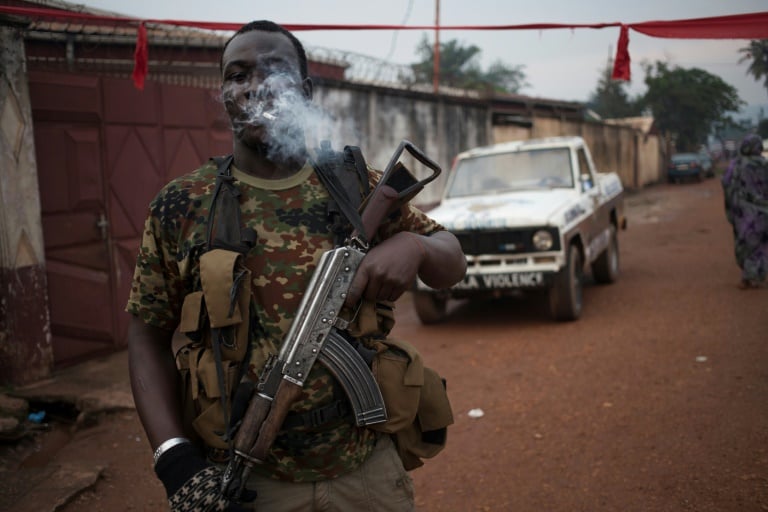Karezza is the slow food of sex
The pot-holed streets of Bangui's Muslim quarter are lined with stalls plying their trade to a cacophony of honking horns and cars backfiring -- a comforting image of bustling life in Central African Republic's capital.
But beneath this veneer of normalcy, many traders in the flashpoint district of PK5 are on edge.
Last month, they agreed as one to stop paying protection money demanded by the numerous “self-defence” militias set up to protect the city’s Muslim minority.
Their defiance prompted an angry response from a militia chief known as “Force.” He gave them a week to get in line.
That deadline expired on January 25.
Now the shopkeepers wait nervously for what happens next.
“We’re going to put an end to this extortion, to this racket,” insists a trader called Karim Yahya, one of more than a thousand traders working in this densely-populated neighbourhood.
“It’s become a fallback for all the crooks,” agrees another who is close to the local traders association.
But he does not give his name, fearing that speaking out could cost him his life after he, like many others, was threatened by Force.
Even so, he too has also had enough. “It’s freedom or death,” he declares.
For now, residents are feeling somewhat reassured by the rather unusual sight of armoured vehicles from the UN’s MINUSCA mission rumbling through the narrow red dirt roads of the PK5 neighbourhood.
And it has not gone unnoticed by Force and his men.
“The MINUSCA forces are driving around without any constraints — they just want to influence the local population,” he raged in a phone conversation with AFP.
– ‘Necessary evil’ –

Many of the self-defence groups in Bangui’s PK5 district were formed by rebels from the mainly Muslim Seleka alliance
The tale sheds light on the chaos and lawlessness that afflict the CAR, one of the world’s poorest and most insecure countries.
PK5’s population used to be fully behind the armed groups, which sprung from a desire to protect their neighbourhoods as the country spiralled into civil war in 2016.
“We were the ones who set up these groups, because the state wasn’t protecting us,” explains Yahya.
A mainly-Muslim alliance, the Seleka, seized power in Bangui but lasted only 10 months before being forced out. All the Muslims either fled the capital or took refuge in PK5.
Constantly under attack by vigilantes from the anti-balaka militias set up to defend Christians from the balaka machetes used by Seleka rebels, the PK5 Muslims funded the creation of their own self-defence groups.
Most of them were former Seleka rebels.
But as time went on, these self-defence groups have increasingly given way to loosely-organised mafia-style gangs.
And it is to these gangs that traders have been paying a monthly “tax” of between 5,000 and 10,000 CFA francs (up to 15 euros/$20) for the flimsy shacks from which they sell their wares.
And each truck of goods has also been subjected to a variable tax of up to 75 euros.
Until now, the traders just put up with it — “a necessary evil,” as many described it.
But that began to change after months of incessant violence, which climaxed in a football match that spun out of control.
– ‘Beautiful game’ turns ugly –
Armed self-defence groups to protect Bangui’s Muslim community first emerged in 2014
On January 17, a group of youths loyal to Force played a team of youngsters linked to “Tola”, another local figure who runs a coalition of armed shopkeepers.
Tempers frayed and someone detonated a grenade, injuring many people who were taken to hospital. Both sides blamed the other.
Furious, Force’s men stormed into a shop owned by Tola’s brother, doused it with petrol then hurled a couple of grenades inside, sparking a huge blaze which gutted the store and others located in the same building.
As the fire raged, other traders could only look on helplessly, kept away from the blaze by the gun-toting arsonists.
“They fired into the ground to make us stay back,” said Abdul, who watched his entire stock of wax-print fabrics go up in smoke — a loss of close to 50,000 euros ($62,000).
Nearly four dozen shops and their stock were reduced to ashes, a loss of more than 2.5 million euros, says Yahya who is heading the group representing the victims.
It was just one more blow to traders working in this bustling commercial neighbourhood, which has been ravaged by bloodshed and violence.
In December, seven people died during clashes between armed groups in PK5, a neighbourhood which has often been at the heart of tensions in the city.
And a month earlier, a grenade attack on a cafe near PK5 left seven dead and more than 20 wounded.
– ‘They electrocute you’ –
Local traders in Bangui want the UN’s MINUSCA mission to work with the authorities to dismantle these gangs
Back on the streets, the traders know they are likely to pay a price for their stand.
“If you defy their orders, they tie your hands and give you an electric shock. And if you block the road (in a protest), they make you drink the canal water,” explained Abdul, referring to the ditch of sewage and wastewater that runs out of the neighbourhood.
They have also filed around 20 complaints against such groups, of which there are around 15 in total, demanding that the state and MINUSCA act to break them up.
Should the authorities or the UN peacekeepers ever decide to intervene, there would be plenty for them to do. But if they do not, Yahya insists he will not back down.
“If MINUSCA doesn’t do it, we will,” he shrugs. And this is no idle threat in a neighbourhood where most people have weapons.
“Being afraid doesn’t help anything,” he says. “What more can we lose on top of everything else that we’ve already lost?”
Download our app